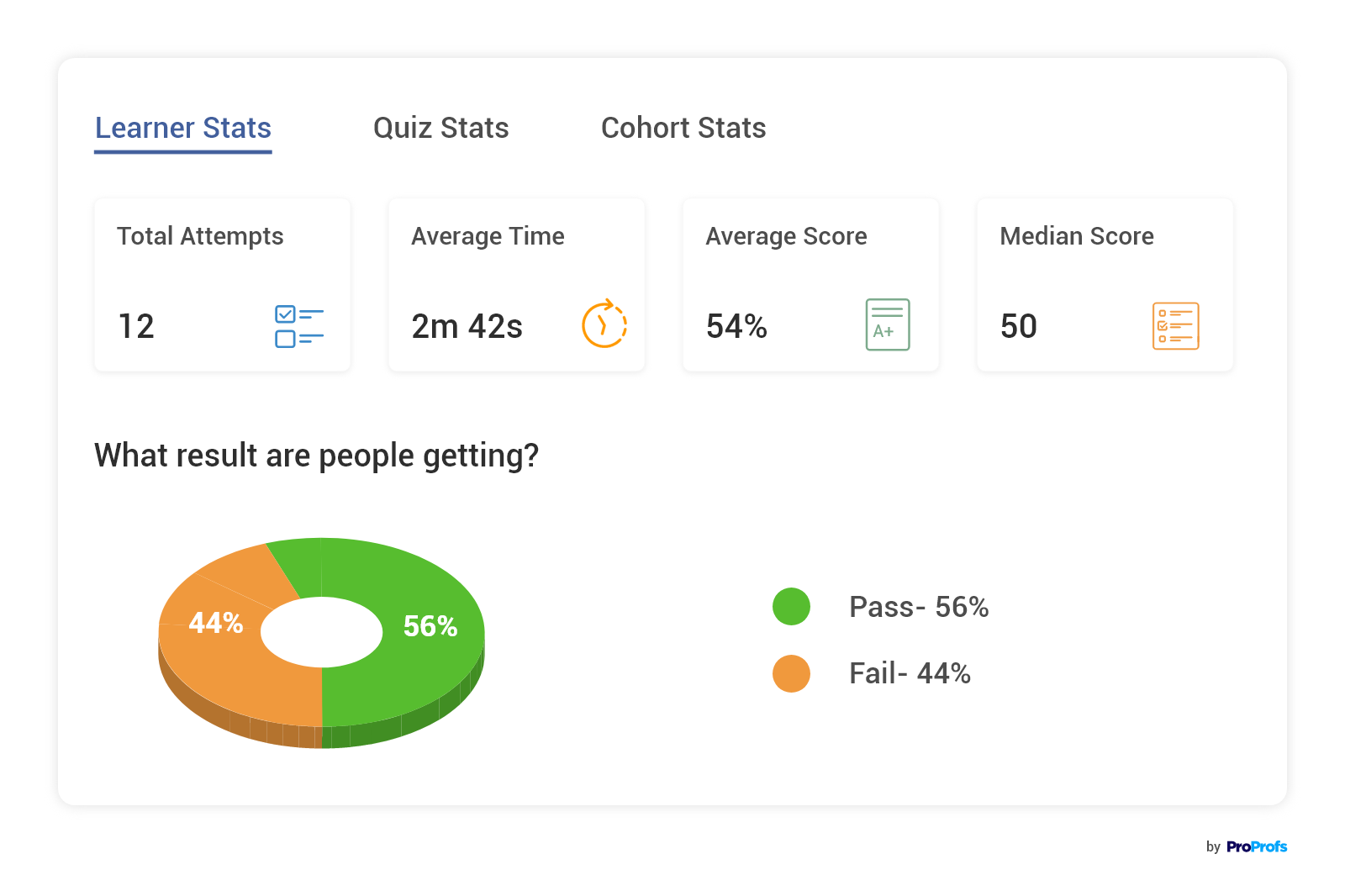Remember the days of grading endless stacks of exams? Leave them behind now!
In today’s digital landscape, where the e-learning industry is seeing a rapid boom, online assessments have become the pivotal tool for educators, trainers and recruiters.
From pinpointing skill gaps to tailoring learning paths, online assessments are revolutionizing the way we learn, train, and hire.
In this blog post, we’ll explore the top benefits of online assessments for businesses and teachers and understand why it’s a great idea to ditch the traditional pen-and-paper method of testing knowledge.
Let’s dive in.
Top 10 Benefits of Online Assessment
Here are 10 solid reasons why online assessments are an invaluable tool for educators and recruiters.
1. Flexibility & Convenience
One of the most evident benefits of online assessments is the flexibility and convenience they provide. Educators, trainers, and recruiters can administer assessments anytime and from anywhere, removing the constraints of a physical location.
Students, trainees, and candidates can also take assessments at their convenience, reducing scheduling conflicts and accommodating diverse learning styles. This flexibility enhances accessibility and inclusivity, ensuring that learners of all backgrounds can participate.
2. Time & Cost Efficiency
Online assessments eliminate the logistical challenges associated with paper-based assessments.
Saving time and costs previously required for printing, distributing, and collecting assessment materials, educators and trainers can focus more on analyzing results, tailoring personalized learning experiences, and leveraging the full benefits of assessments in education and training.
Additionally, automated grading and feedback systems in online assessments provide instant results, enabling faster turnaround times and reducing manual effort.
Watch: How to Automate Quiz Scoring & Grading
3. Effortless Assessment Creation
Using top online assessment tools, you can create an online assessment in less than a minute.
For example, with ProProfs Quiz Maker, you can:
- Create a quiz in seconds using an advanced AI quiz maker.
- Get started with a ready-to-use quiz created by a ProProfs user (there are 100,000 of them)
- Pick from hundreds of skill and psychographic assessments designed by subject matter experts
- Import from a massive question bank containing over a million ready-to-use questions
Watch: How to Create a Quiz Using Question Bank & Templates
4. Enhanced Reporting & Data Analysis
Online assessment reports provide a rich source of data for insightful analytics. Educators can use this data to analyze student performance trends, pinpoint areas needing improvement, and refine their teaching methods.

In a similar vein, trainers and recruiters can leverage these insights to understand the strengths and weaknesses of their trainees or candidates, facilitating targeted skill development and more informed hiring decisions.

Additionally, online assessments enable long-term data tracking, allowing educators and trainers to monitor progress, evaluate learning outcomes, and assess the impact of their strategies over time. This approach fosters evidence-based decision-making and continuous improvement.
Additionally, online assessments enable long-term data tracking, allowing educators and trainers to monitor progress, evaluate learning outcomes, and assess the impact of their strategies over time. This approach fosters evidence-based decision-making and continuous improvement.
Watch: How to Review Quiz Reports & Statistics
5. Interactive & Effective Assessments
Online assessments let you ask questions in various interactive formats and incorporate multimedia and gamification, enhancing engagement and participation.
Watch: 15+ Question Types for Online Learning & Assessment
By incorporating multimedia components, educators and trainers can create a more immersive learning experience that caters to various learning styles.
You can ask questions based on videos, images, or audio clips or have images as answer options. You can also provide instant answer explanations and add images to them to make them more useful.
Watch: How to Create a Video Quiz
Recruiters can also benefit from the multimedia features in online assessments. They can design assessments that simulate real-world scenarios to gauge candidate competencies effectively, resulting in a more accurate evaluation.
6. Remote Learning & Hiring
Amidst the global pandemic, online assessments have been pivotal in facilitating remote learning and ensuring uninterrupted education and training.
Educators and trainers can easily transition to the online environment and reach learners worldwide, transcending geographical boundaries.
Recruiters can also remotely assess candidates, allowing organizations to tap into a global talent pool and sustain recruitment efforts despite physical restrictions. Some online assessment tools also let you conduct remote interviews.
For example, ProProfs Quiz Maker lets you create video response quizzes that you can use to conduct interviews remotely in a flexible way.
Video interview quizzes allow interviewers and interviewees to participate in the interview at their convenience, removing scheduling issues and geographical barriers.
Watch: How to Create a Video Interview Question
7. Immediate Feedback & Remediation
With online assessments, learners receive instant feedback on their performance. Immediate feedback allows students to identify and address their areas of weakness promptly, providing an opportunity for remediation.
Trainers can also track trainees’ progress in real-time and deliver timely feedback, enabling ongoing skill development. They can deliver this feedback through two complementary and equally effective methods:
Instant, automated answer explanations after each question or at the end of the assessment

Personalized, manual feedback via text, audio, or video in the assessment report


8. Test Security & Integrity
The best online assessment tools provide robust security measures to ensure the integrity of the assessment process.

Features such as password protection, secure classroom logins, question/answer shuffling, tab switching prevention, proctoring, question pooling, time limits, etc., help mitigate the risk of malpractice, ensuring a fair and trustworthy assessment environment for all parties involved.
And if you’re using the right assessment tool, configuring these security settings and functionalities is super-easy, too.
Watch: How to Configure Settings for Online Assessment
Features such as password protection, secure classroom logins, question/answer shuffling, tab switching prevention, proctoring, question pooling, time limits, etc., help mitigate the risk of malpractice, ensuring a fair and trustworthy assessment environment for all parties involved.

And if you’re using the right assessment tool, configuring these security settings and functionalities is super-easy, too.
Watch: How to Configure Settings for Online Assessment
9. Accessibility
Online assessments can be designed to accommodate different learning needs and disabilities. With features such as speech-to-text or text-to-speech, learners with visual impairments and reading or writing difficulties can easily access and engage with assessment content.
10. Reduced Administrative Burden
Online assessments significantly reduce the administrative workload associated with traditional paper-based exams. Learners find it easier to register for exams, eliminating the need for printing and dependence on postal services and enabling remote invigilation.
For example, with ProProfs Quiz Maker, you can create virtual classrooms and group learners by team, location, or any other criteria. You can also create multiple instructor accounts and assign group admins to streamline test assignments and learner management.
Watch: How to Set up Your Virtual Classroom
Other benefits of online assessments include:
- Environmentally friendly: Online assessments minimize environmental impact by reducing the use of paper, printing, and transport and eliminating the need to travel to exam centers.
- Integrations with other technology: You can connect online assessments with online learning record stores, applicant tracking systems, and spreadsheet tools to further refine test reporting and analysis.
- Collaboration: Online assessment tools let instructors easily collaborate with peers on assessment creation, learner management, and other tasks.
- Question pooling: You can create a question bank and use it to automatically present a different set of questions to each learner or conduct multiple assessments on the same topic.
Challenges & Considerations
While the benefits of online assessments are clear, it is important to acknowledge and address the challenges and considerations associated with their implementation.
Here are a few key challenges and considerations to keep in mind:
- Technology Requirements
Online assessments rely heavily on technology and require a stable internet connection, access to appropriate devices (computers, tablets, smartphones), and familiarity with the assessment platforms. It is essential to consider the accessibility of technology for all participants to ensure equitable access to assessments.
- Test Security and Cheating Prevention
While online assessments have robust security measures in place, there is always a risk of cheating or unauthorized access to assessment materials. Educators, trainers, and recruiters need to implement effective strategies such as online proctoring tools or secure browser lockdowns to maintain the integrity of the assessment process.
- Technical Issues & Support
Technical issues like server downtime, software glitches, or connectivity problems can disrupt the assessment process. Online assessment tool providers should offer reliable technical support to address any issues and ensure uninterrupted access for all participants.
- Privacy & Data Protection
Online assessments involve collecting and storing personal data, such as student or candidate information. It is important to comply with data protection regulations and ensure that appropriate security measures are in place to safeguard sensitive data during transmission and storage.
- Bias & Equity
Online assessments may inadvertently introduce bias if not designed and administered carefully. Educators and recruiters should consider the impact of cultural, linguistic, or socioeconomic factors on assessment outcomes. Regular review and validation of assessment content can help minimize bias and ensure fairness for all participants.
Embrace the Power & Benefits of Online Assessment Tools
In summary, the shift towards online assessments marks a significant advancement in learning and recruitment. These digital tools not only streamline the assessment process but also enhance learning experiences and hiring decisions through their flexibility, efficiency, and innovative features.
Among these tools, ProProfs Quiz Maker stands out as a versatile and user-friendly option. It has an advanced AI quiz generator, hundreds of professionally designed skill assessments, a vast question bank, interactive question types, and robust security, proctoring, and reporting features.
ProProfs Quiz Maker’s ease of use and powerful features make it an ideal choice for educators, trainers, and recruiters looking to leverage the full benefits of online assessments.
FAQs
What are the benefits of assessments in learning?
Online assessments offer several key advantages for learning:
- Immediate Feedback: Enables students to identify and work on their weaknesses quickly.
- Personalized Learning: Allows educators to tailor instruction based on individual student performance.
- Student Engagement: Interactive and multimedia elements make learning more engaging and enjoyable.
- Progress Tracking: Facilitates continuous monitoring of student progress and adaptation of teaching strategies.
- Self-Regulation: Encourages students to take charge of their learning through self-assessment and goal setting.
- Critical Thinking: Challenges students to apply knowledge critically rather than relying on rote memorization.
Why is assessment important in online learning?
In online learning, assessment is key for providing structure and feedback in an environment where physical classroom cues are absent. It helps in verifying student engagement and understanding, ensuring the effectiveness of the digital learning process.
Regular assessments also maintain a sense of accountability and progress tracking, which is crucial in a virtual setting where direct teacher-student interaction is limited.
How to create an online assessment.
Follow these six steps to create an effective online assessment:
- Define Objectives: Identify what you want to assess (knowledge, skills, etc.).
- Choose a Platform: Select an online assessment tool that fits your needs.
- Design Questions: Develop a mix of question types relevant to your goals.
- Customize Assessment: Set rules (time limits, scoring) and personalize the layout.
- Test Your Assessment: Conduct a trial run to ensure functionality.
- Launch and Monitor: Distribute the assessment and analyze the results for insights.
FREE. All Features. FOREVER!
Try our Forever FREE account with all premium features!







